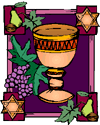|
|
|




|
February 1999
|
Overview
Festivals are regular religious celebrations remembering God's great acts of
salvation in the history of His people. Traditionally called "feasts" in the
English Bibles, these can conveniently be categorized according to the frequency
of celebration. Many of these feasts or festivals were timed according to cycles
of seven. The cycle of the week with its climax on the seventh day, provided
the cyclical basis for much of Israel's worship; as the seventh day was observed,
so was the seventh month (which contained four of the national festivals), and the
seventh year, and the fiftieth year (the year of Jubilee), which followed seven
cycles of seven years.
These seven holidays which God instituted for His chosen nation of Israel
are discussed throughout the Bible (in both the Old and New Testaments); however,
only in one place (Leviticus Chapter twenty-three) are all seven holidays listed
in chronological order. These holidays are called "the feasts of the Lord" which
simply means that they belong to God and are His holidays. Only on God's
terms can men participate in them and enter into their benefits (Leviticus 23:4).
The term feasts in Hebrew literally means "appointed times."
God has carefully planned and orchestrated the timing
and sequence of each of these seven feasts to reveal to us a special story.
These feasts (often called "holy convocations) are intended to be a time of
meeting between God and man for "holy purposes." Since these seven feasts
of the Lord are "appointed times" for "holy purposes," they carry with them
great sacredness and solemnity.
Four of the seven holidays occur during the springtime. The first four feasts (Passover,
Unleavened Bread, Firstfruits, and Weeks) have already been fulfilled by Christ in the
New Testament.
The final three holidays (
Trumpets, Yom Kippur, and
Tabernacles) occur
during the fall within a brief fifteen-day period in the Hebrew month of Tishri. Tishri
corresponds to the months of September/October on the Gregorian calendar. These fall feasts have not
yet transpired; however, without absolute certainty these events most assuredly will
unfold. As the four spring feasts (holidays) were fulfilled literally and right
on schedule in connection with Christ's first coming, these three fall feasts (holidays)
will likewise be fulfilled literally and right on schedule in connection to
the Lord's second coming. These final three feasts form the basis
for what the Bible calls in Titus 2:13: "the blessed hope."
A number of important points must be emphasized concerning these seven feasts of the Lord.
| Seven Important Points About These Feasts |
| They were given to
the Hebrew (Jewish) nation of Israel by God as a covenant. |
| They were based on the Jewish lunar (moon)
calendar which consists of approximately 354 days in a year.
|
| They relate to Israel's spring and fall
agricultural seasons; after all, Israel was and still is largely an agricultural nation.
|
| They typify the timing, sequence, and significance
of the major events of the Lord's redemptive career. They begin at Calvary where Jesus
voluntarily laid down His life for the sins of mankind (symbolic of Passover) and end when the
Lord establishes His messianic Kingdom at His second coming (symbolic of Tabernacles). God in His
infinite wisdom made these appointed feasts conform to specific events in the
life of His Son Jesus Christ (Yeshua).
|
| Since these feasts are clearly
fulfilled in Messiah, every creature is presented the unique opportunity to "meet"
with God and receive His gracious blessings.
|
| There is a binding relationship between
the true Church and Israel even though both are distinct entities with diverse
promises. Thanks to the Abrahamic, Davidic, and New Covenants
which God made with Israel, the blessings stemming from these feasts are
no longer exclusive to the Jewish people alone but are extended to the Gentiles as well, for
God's unconditional covenant with Abraham promised that
"In thy (Abraham's) seed shall all nations be blessed" (Genesis 22:18).
|
| There are a total number of seven feasts of the
Lord. Seven is the biblical number for completion. It is recorded in Genesis chapter one
that God rested on the seventh day after creating the heavens and the
earth, not due to fatigue but rather to emphasize completion and satisfaction. What
God created was "good" and "satisfying"; therefore nothing else was needed.
|
To summarize, these seven feasts of the Lord are God's appointed times during
which He will meet with men for holy purposes. When completed, these seven special
holidays will triumphantly bring and end to this age and usher in a glorious
"Golden Age."
Now click on the table
below to learn more about each of these seven feasts (holidays).
|
|



 Back to the "Christ-Centered Mall" Back to the "Christ-Centered Mall"

This teaching was written by David Holt Boshart, Jr.
All scans done by Christ-Centered Mall, Inc. are prohibited from being copied.
All applicable copyright© laws apply and are reserved by Christ-Centered Mall.
Web pages copyright© 1998-2010. |
|


 Back to the "Christ-Centered Mall"
Back to the "Christ-Centered Mall"